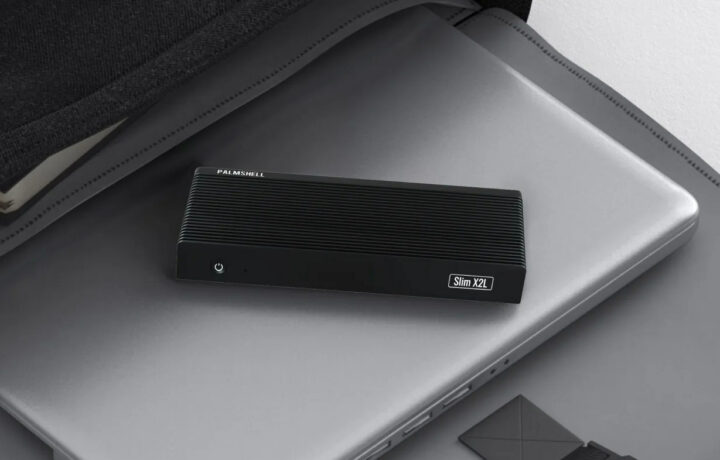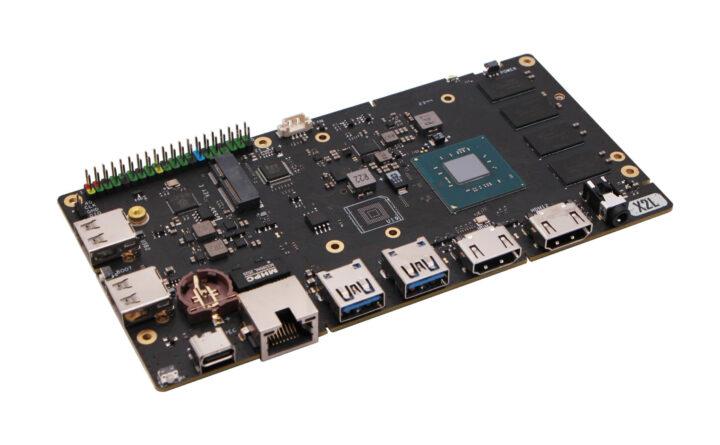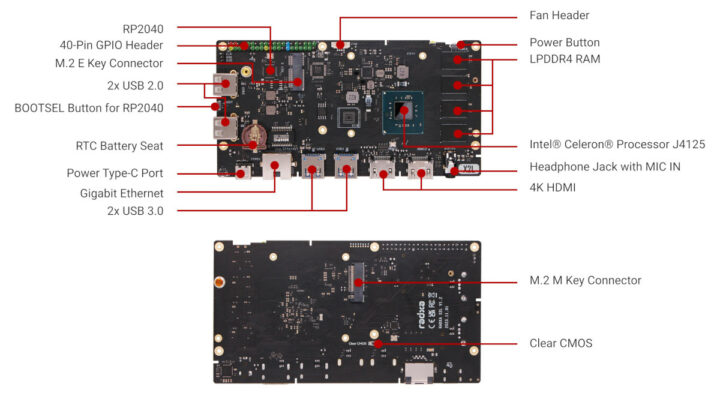Radxa X2L is an inexpensive Intel Celeron J4125 Gemini Lake Refresh single board computer (SBC) that ships with 2GB to 8GB RAM, an M.2 socket for SSD storage, another M.2 socket for a wireless module, and offers a range of ports such as dual HDMI, gigabit Ethernet, four USB port, and a 40-pin GPIO header.
The price starts at $39, a price point that reminds me of the Atomic Pi SBC introduced a few years ago with an Atom X5 Cherry Trail processor, but the Radxa X2L is easier to use, offers better performance and modern features, as well as a low-profile form factor that’s about the size of a smartphone, just a bit thicker.
Radxa X2L specifications:
- SoC – Intel Celeron J4125 quad-core Gemini Lake Refresh processor @ 2.0 / 2.7 GHz (Turbo) with Intel UHD Graphics 600 @ 250/750 MHz; 10W TDP
- MCU – Raspberry Pi RP2040 microcontroller for GPIO control
- System Memory – 2GB, 4GB, or 8GB LPDDR4 RAM (2,400 MT/s)
- Storage
- 1x M.2 M-Key (PCIe 2.0 x4) socket for 2280 NVMe SSD up to 2,000 MB/s
- Optional 32GB eMMC flash
- Video Output – 2x HDMI ports up to 4K @ 30 Hz
- Audio – 3.5mm headphone jack with microphone input; digital audio via HDMI
- Connectivity
- Gigabit Ethernet (RJ45) port
- Optional WiFi and Bluetooth module via M.2 E-Key socket
- USB – 2x USB 3.0 Type-A ports, 2x USB 2.0 Type-A ports
- Expansion
- 40-pin color-coded GPIO header with up to 2x SPI, 2x UART, 2x I2C, 16x PWM, 8x PIO (Programmable IO), 5V DC power in, 3.3V power pin
- M.2 M-Key socket for NVMe SSD
- M.2 E-Key socket for wireless module
- Misc
- RTC battery socket
- 4-pin header for PWM fan
- 3-pin debug header
- Power button, BOOTSEL button (for RP2040), clear CMOS button, and user button
- Power Supply – 12V/2A via USB-C port (USB PD support)
- Dimensions – 155 x 80 x 10 mm
- Temperature Range – 0 to 50°C
- Certifications – FCC, CE
Radxa says the X2L SBC supports Windows 10 Pro (so implicitly not Windows 11), as well as Debian and Ubuntu Linux distributions. As an x86 platform, it should support other operating systems too (minus custom implementations such as the GPIO header), but those are not listed on the Radxa website. Radxa told CNX Software they developed the Roobi firmware running on a small eMMC flash to directly install operating systems from the internet. We’ve seen that for Arm in the past on products from Khadas and Libre Computer, but I think it’s the first time I see it implemented on an x86 device.
Documentation is not available yet, but again, an x86 device should mostly work out of the box, and we’ve recently seen GPIOs are working fine with other Intel boards running Ubuntu 22.04 such as the Youyeetoo X1 and AAEON UP 7000, although each will implement this differently.
The Radxa X2L sells for $39 and up on Arace and AllNetChina. That price is for the model with 2GB RAM to which you’d need to add an M.2 SSD and a USB PD power supply, and most users will want to add the $6 heatsink and fan. If you’d rather get a model with the 32GB eMMC flash, only the 8GB model is available right now for $79. Further details may be found on the product page.

Radxa is also working on the pocket-size Palmshell Slim X2L mini PC based on the X2L SBC that should launch this year, and further in the future, we should expect an Alder Lake-N SBC once the Gemini Lake Refresh family reaches end-of-life and can’t be purchased anymore.

Jean-Luc started CNX Software in 2010 as a part-time endeavor, before quitting his job as a software engineering manager, and starting to write daily news, and reviews full time later in 2011.
Support CNX Software! Donate via cryptocurrencies, become a Patron on Patreon, or purchase goods on Amazon or Aliexpress. We also use affiliate links in articles to earn commissions if you make a purchase after clicking on those links.






Power Supply – 12V/2A via USB-C port (USB PD support)
$39
… Wow, that’s nice!
What is the power consumption?
No data yet for the X2L, but for reference, we’ve tested some Celeron J4125 platforms in the past:
https://www.cnx-software.com/2021/05/19/beelink-gkmini-review-an-intel-celeron-j4125-mini-pc-reviewed-with-windows-10-pro-ubuntu-20-04/#power-consumption
https://www.cnx-software.com/2022/12/06/mele-pcg02-pro-review-a-fanless-intel-celeron-j4125-n5105-mini-pc-with-an-ultra-compact-form-factor/#mele-pcg02-pro-power-consumption
It appaers they have a website setup for the SLiM X2L with Wiki, aswell as the other new products – NeXT H2 and PuER N1.
So Palmshell is the new Radxa sub-branch according to this page…?
https://palmshell.io/slim-x2l
It’s not the first Palmshell device: https://www.cnx-software.com/2023/09/30/palmshell-next-h2-sbc-micro-server-10gbe-networking/
Yes, it’s related to Radxa in someways.
I forgot that you already reported the Next-H2 as I didn’t know it was associated to Radxa. LOL
I look forward to your review of the X2L later in the year.
I wonder if lack of Windows 11 support is due to lack of TPM, and if so, can you connect an external TPM 2.0 unit.
I looked it up, J4125 is officially supported by Windows 11 and can be used by OEMs. Lack of TPM should be able to be bypassed by a manual install, if that’s the problem. You might even be able to reuse a Windows 10 Pro key to activate Win11 (not sure).
In general there’s a workaround for almost everything with Windows, and MS cares more about hooking people into Office365 than protecting the OS.
Do you still get windows updates if you bypass the HW compatibility test?
I vaguely remember that you have update limitations (perhaps this only refers to 23H2 updates, I’m not sure)
OK, found one reference:
Update Windows 11 to next feature release after bypassing CPU check – Super User
You can update to 23H2 only by booting a 23H2 ISO and doing the bypass trick again, or by creating a special ISO that already contains the bypass.
You cannot update to 23H2 using the upgrade assistant.
No problem install windows 11, the J4125 is support Win11
Really nice! What UP boards ought to have been in fact, and with one less digit on the price!
Hey, pretty cool. And the 4gb model is only 10$ more.
This doesn’t appear to be the atomicpi situation of “we accidentally made thousands of a board then the buyer backed out”. So I can only imagine the low price means that Intel is clearing out stock of their j4125.
So I wonder about the availability “through 2030” … !
Just idly curious, what is the seemingly unpopulated “U19” area in the center of the board for .. ?
I think that’s where the eMMC module would be on the models with it
Not too bad but I wonder if interest will really last. I’m sure. that comparison will be made with the RPI 5 4Gb model.
The I/O is pretty good, with support for a 2280 SSD.
Seems odd that HDMI is only 1.4 though, despite the processor supporting 2.0.
Once you add up all the cost of the accessories generally required, might it end up costing more than a J4125 mini PC of similar specs?
From and end user perspective, I also wonder who this is going to appeal to most. Perhaps the casual game emulator?
If this had an N95 then I think it would be a different beat but I fear that this might become one of those purchases to ultimately regret quite quickly.
I know a number of people who are constantly seeking for the small “bring everywhere” PC, that’s useful when you’re an IT consultant to serve as a test endpoint at customers, to run a network probe or temporary monitoring console, or network capture device that you leave for a night, or that are used as convenient presentation/video players that you can carry with you to friends to show your own sports video captures or plug to the video-projector at customers to show a demo of your latest application, etc. Some of such use cases are sufficiently well covered by some of the modern SBC such as RPi4/5 but not all. One alternative is the Mele PCG02 but not at the same price (~$200).
J4125 products like the Acer Aspire XC get sold for around $80-90 sometimes. If you can find a mini PC with N95/N97/N100 for $150, few regrets there.
I think this board is good if you keep the costs down as low as possible and actually use it as an SBC. Such as keeping it at 2-4 GB, or actually utilizing the GPIO and integrated RP2040. It can be easily justified over competing RPi since it’s easier to work with x86.
It’s “slow”™ but could be retired to handle something like IPTV. It can emulate systems like Dreamcast, PSP and GameCube, as seen on ETA Prime.
Another option to get this type of device is Wyse 5070 thin client, used ones are now quite cheap on ebay, it is either based on Pentium J5005 or this Celeron and comes in metal box with passive heatsink and has 2x sodimm ddr4 slots for easier memory expansion. There is also extended version with extra 4x pcie slot.
That is very cheap, did they use the full 128-bit memory bus or did they cut it down?
of cause the dual channel 128-bits for 4GB RAM
Unusual to use lpddr
I wish there was a few sata ports, or a standard PCIe connector (shared with m.2) to make it a nice nas platform, too
Will you Test the Palmshell Slim X2L Mini PC?
Yes, it’s likely that we will review it. Not sure about the timing though, as we have 5 or 6 other mini PC reviews to complete first.
The Palmshell X2L seems to be available now, but appears to be rather expensive at north of US$100 and also doesn’t appear to use passive cooling, which let me expect a noisy device unsuitable for concentrated work in a quiet environment.
Sold out for weeks now despite availability claim until at least 2030. Looking forward to the Palmshell Slim X2L though.